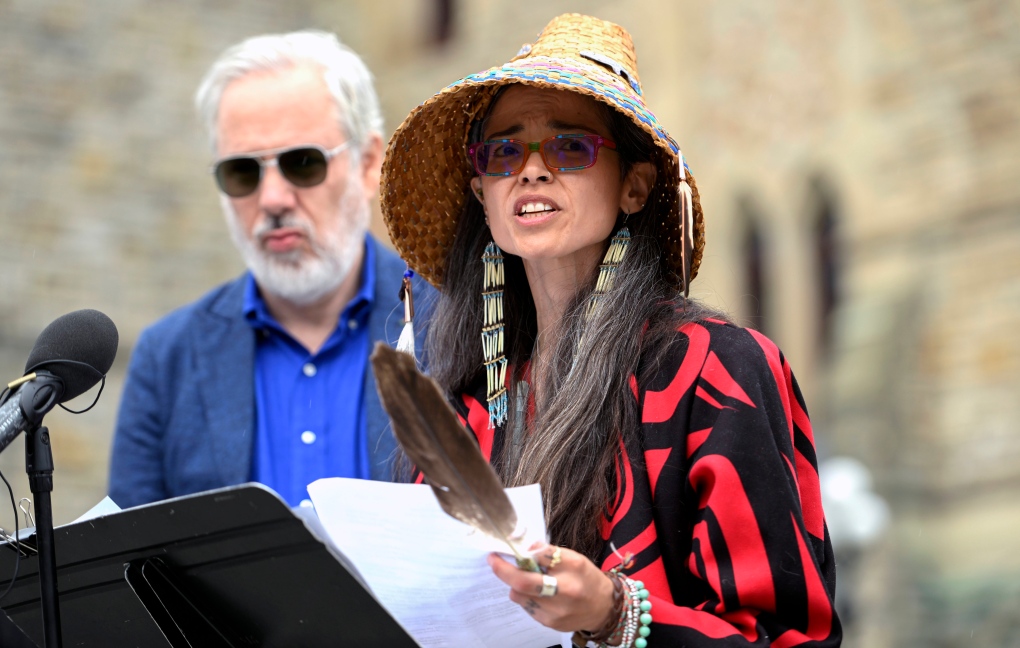The latest:
Nova Scotia on Thursday said it would ramp up its COVID-19 vaccine booster program, as the Omicron variant of the novel coronavirus continued to drive high case counts in that province and elsewhere in Atlantic Canada.
Starting next week, Nova Scotia will accelerate its descending age-based approach for boosters to include those 30 years of age and older, Premier Tim Houston told reporters. About 500,000 people aged 30 to 49 will become eligible for a booster in January.
“We have to shift the focus to boosting,” Houston said. “We know being vaccinated protects people, especially against severe illness, and we know the booster provides increased protection.”
Health officials identified 511 new cases of COVID-19 on Thursday and said there were 5,106 active infections. A total of 7,594 cases have been reported over the last two weeks. Officials said 25 people were hospitalized with the disease, including three patients in intensive care.
Dr. Robert Strang, chief medical officer of health, said that public health is closely monitoring hospitalizations.
“So far it’s very low, about 0.5 per cent,” Strang told reporters, referring to the percentage of cases that end up in hospital. “It is ticking upward but we’re seeing a moderate rise, which gives some comfort but it’s also not enough to relax at this point in time.”
Strang said the speed of the highly infectious Omicron variant means the virus will move quickly through the population. What’s important, he added, is slowing down the spread so the health system isn’t overwhelmed.
In Prince Edward Island, chief public health officer Dr. Heather Morrison said that emerging evidence indicating the Omicron variant is relatively mild to moderate in its effects means that the virus in her province is beginning to transition from a “pandemic to endemic state.”
“Meaning that there will be at some point stable transmission of this virus,” Morrison told reporters, as the premier outlined a plan to restore a financial benefit plan for impacted workers.
The Island reported a single-day record of new COVID-19 cases Thursday, with 169 new infections. Morrison said the source of about 20 per cent of new cases was unknown, indicating community spread. Three people were in hospital because of the disease, while five other patients in hospital for non-COVID-19 reasons have tested positive.
Meanwhile, health officials in Newfoundland and Labrador reported 349 new cases of COVID-19 Thursday, breaking Wednesday’s one-day case record of 312. There were 1,428 active reported infections in the province and one person was in hospital with the disease.
New Brunswick reported 572 new cases of COVID-19 Thursday and two more deaths attributed to the virus. There were 40 people in hospital with the disease, including 16 in intensive care. Provincial officials are expected to hold a briefing Friday morning to discuss testing, tracing and isolation procedures “in light of the dominant Omicron variant.”
-From The Canadian Press and CBC News, last updated at 7 a.m. ET
What’s happening across Canada
Quebec residents will once again face an evening curfew, beginning 5 p.m. on New Year’s Eve, as the province shatters its single-day COVID-19 record. In Ontario, residents with symptoms are being told to assume they have COVID-19 and skip a PCR test, as the province struggles to keep up with a surge in testing demand. 2:28
For more details on the situation in your province and territory — including the latest on hospitalizations and ICU capacity, as well as details on how provinces are handling surging demand for tests — click through to the local coverage below. With testing capacity strained, experts say true case counts are likely far higher than reported. Hospitalization data at the regional level is also evolving, with several provinces saying they will begin to report more precise data that separates the number of people in hospital because of COVID-19 from those in hospital for another medical issue who also happen to test positive for COVID.
In Central Canada, a ban on private gatherings is now in effect in Quebec and a COVID-19 curfew is set to begin at 10 p.m. Premier François Legault announced the new restrictions at a news conference Thursday in Montreal.
Legault said hospitals in the province risk being overwhelmed as the number of patients with COVID-19 continues to rise and that hospitalizations linked to the disease doubled in a week. The premier has also ordered restaurants to close their dining rooms and said in-person classes at schools, universities and junior colleges will not resume until at least Jan. 17. Places of worship have also been ordered to close, except for funerals which will be limited to 25 people.
Ontario, which is also seeing surging cases, is delaying the start of school by two days and revamping testing and isolation rules, as daily COVID-19 cases continue to break records. Classes were set to resume Monday in much of the province, but the holiday break will now end on Wednesday.
Chief Medical Officer of Health Dr. Kieran Moore also announced that publicly funded PCR testing will now be available only for high-risk individuals who are symptomatic or are at risk of severe illness from COVID-19.
In the Prairie provinces, Manitoba saw a single-day high of 1,123 cases of COVID-19 on Thursday, with three additional deaths. Lanette Siragusa, chief nursing officer for Manitoba Shared Health, said the number of people in hospital — 190 — is the highest the province has seen since the third wave.
Saskatchewan Premier Scott Moe said Thursday the government is changing the metric of how it tracks COVID-19 infections as the province sees rising cases, but decreasing hospitalizations. Moe said he won’t bring in any new public health orders or restrictions because vaccines and regular testing are lowering the number of deadly health conditions caused by the Omicron variant of COVID-19. The province as of Thursday had 79 people in hospital related to COVID-19, including 14 in intensive care. Moe’s update came as the province reported 589 new cases and four additional deaths.
Alberta, meanwhile, is delaying the return to kindergarten to Grade 12 classrooms until Jan. 10 as it sees surging COVID-19 cases.
In the North, Yukon on Thursday reported 34 new cases of COVID-19, while Nunavut reported 20 additional cases. The Northwest Territories, which saw more than 30 new cases, announce it too would be delaying the return to in-school learning to Jan. 10.
In British Columbia, health officials saw 4,383 new cases of COVID-19 on Thursday with one additional death. The province’s health officer, Dr. Bonnie Henry, in a year-end interview with CBC News, said the virus will eventually become endemic, but she cautioned that there are still many unknowns about what is to come.
-From The Canadian Press and CBC News, last updated at 7 a.m. ET
What’s happening around the world

As of early Friday morning, roughly 286.5 million cases of COVID-19 had been reported worldwide, according to Johns Hopkins University’s coronavirus tracker. The reported global death toll stood at more than 5.4 million.
In the Middle East, Israel is to go ahead with second COVID-19 vaccine booster shots for people with weakened immune systems, the top government health official said on Thursday, but a final decision on wider usage is still pending.
In Europe, Britain has approved Pfizer’s COVID-19 pill for patients over the age of 18 years who have mild to moderate infection and are at high risk of their illness worsening. The approval comes as the country scrambles to build its defences amid rapid increasing case numbers. Based on data, the pill, Paxlovid, is most effective when taken during the early stages of COVID-19, Britain’s Medicines and Healthcare products Regulatory Agency (MHRA) said on Friday, recommending that the drug be used within five days of the onset of symptoms.
In Africa, South Africa has lifted a midnight to 4 a.m. curfew on people’s movement with immediate effect, believing the country has passed the peak of its fourth COVID-19 wave driven by the Omicron variant.
As of today the cumulative number of <a href=”https://twitter.com/hashtag/COVID19?src=hash&ref_src=twsrc%5Etfw”>#COVID19</a> cases identified in SA is 3 446 532 with 12 979 new cases reported. Today 126 deaths have been reported bringing the total to 91 061 deaths. The cumulative number of recoveries now stand at 3 159 143 with a recovery rate of 91,7% <a href=”https://t.co/bJftLs1qro”>pic.twitter.com/bJftLs1qro</a>
—@HealthZA
In the Asia-Pacific region, the Philippines will impose tighter curbs in the capital region for the next two weeks, the acting presidential spokesperson said on Friday, to try to limit infections by the Omicron coronavirus variant that is spreading globally. The health ministry on Friday recorded 2,961 new coronavirus infections, a two-month high, and reported a positivity rate of 10.3 per cent.
The region including the capital Manila is an urban sprawl of 16 cities that is home to more than 13 million people. It will be placed under the third of a five-scale alert system on Jan. 3 to 15, spokesperson Karlo Nograles said.
New coronavirus infections soared again in Australia on Friday to a record of more than 32,000, just days after surpassing 10,000 for the first time. While hospitalizations and deaths have been increasing from the surge, so far they haven’t reached comparative levels seen in previous outbreaks.
Meanwhile, South Korea says it’ll extend its toughest social distancing rules for another two weeks to try to lower critical cases and guard against the Omicron variant.
In the Americas, the Pfizer and BioNTech COVID-19 vaccine caused mostly mild side effects in children aged 5 to 11 years, according to data published by the U.S. Centers for Disease Control and Prevention on Thursday.
-From The Associated Press and Reuters, last updated at 8:15 a.m. ET







More Stories
‘Learn to walk again’: Sask. doctor tells story of miracle recovery from deadly heart condition
Canadians more likely to eat food past best-before date. What are the risks? – National | Globalnews.ca
What a urologist wants you to know about male infertility